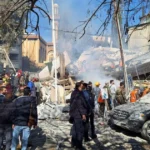Israel has sealed an $8.7 billion package from the United States to strengthen its military capabilities, especially in air defence, amidst ongoing threats that it faces from Hamas from Gaza and Hezbollah in Lebanon.
This generous agreement marks a culmination of the close strategic partnership between the two nations, ensuring that Israel maintains a qualitative edge on its regional military capabilities.
The package falls into two categories. Firstly, $3.5 billion is allocated to be transferred to Israel in mandatory wartime procurement for purchasing essential military equipment. Second, $5.2 billion will fund Israel’s air defence systems. The money allocated shall chiefly serve to finance the particularly well-known Israeli anti-missile system known as Iron Dome, as well as for the development of David’s Sling and an advanced laser defence system in its last stages.
It came after several negotiations between Defence Ministry director-general Eyal Zamir and US defence officials, mainly acting Under Secretary of Defense for Policy Amanda Dory. This deal indicates that the United States is committed to a more robust way to secure Israel, and it helps call attention to regional threats by Iran and proxies.
The Iron Dome is a massive part of Israel’s defence infrastructure to intercept short-range rockets coming from Gaza and save its civilians. David’s Sling provides excellent protection for medium- to long-range missiles. A new high-powered laser system promised by this innovation would give an additional layer of defence against the gamut, ranging from rockets to drones.
Battles on both ends—against Hamas in Gaza and Hezbollah in Lebanon—are, indeed, the rising issue of regional instability. While Hamas continues to fire rockets from Gaza, Hezbollah, armed by Iran, has spent its military muscle, making a difference in Israel’s defence policy. According to officials, Hezbollah is a more significant threat than Hamas.
The much-needed U.S. aid package worth $8.7 billion would be able to sustain the Israeli military operation in the face of such challenges, as the country is likely to continue combating both present and future threats and challenges. At this time, when tensions are running high and threats of wider conflict are looming large, the advanced defence system investment happens at the right moment.
Another reason is that the aid package enhances the long-established defence relationship between the United States and Israel. For many years, the United States has been very consistent in its defence assistance to Israel through billions of dollars in annual military aid. The package reaffirmed that commitment as it highlighted mutual security concerns both countries share: the increasing influence of Iran and its network of militias across the region.
It is promising, showing an economical way of stopping missile threats, and it holds much promise in the advanced laser defence system being developed. Unlike existing missile interceptor systems, the laser-based system destroys incoming targets by harnessing concentrated energy, providing a faster and more sustainable solution.
The U.S. aid package will be instrumental in helping Israel face the complex security challenge posed by its arch-nemesis, Iran, and its allies. Since these resources are going to enable Israel to maintain the ever-increasing complexes of its security and stability, they will do so in an increasingly volatile region.















